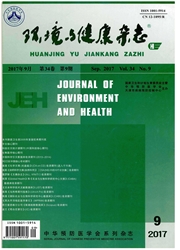

 中文摘要:
中文摘要:
ObjectiveThere 是热浪事件引起死亡和紧急情况盒子的证据。这篇文章使用了偶然的估价方法发现心甘情愿支付保护的措施并且调查了影响心甘情愿到 pay.MethodsA 的因素代表性的面对面家庭调查被 637 个城市的长期的居民和 591 个农村长期的居民在中国北京 15-79 完成。二进制逻辑回归被用来识别为保护的措施影响了支付率或支付数量的因素,包括为区域的独立变量,性,年龄,教育,收入,空调所有权,热浪经验,并且长期的不会传染的 disease.ResultsThe 支付率为政府提供的保护的措施是41.1%,39.5%由市场由措施提供了。大多数回答者愿意付 40 CNY 人均每年由政府或市场为措施提供了。影响心甘情愿付钱的因素是区域,性,收入,空调所有权,热浪经验,和为热浪的长期的不会传染的 disease.ConclusionProtective 措施立即要规定的需要。更多的注意应该对脆弱的组的状况被给予,例如住在城市的区域的人,那些没有在过去经历了热浪的空调,和那些。
 英文摘要:
英文摘要:
Objective There are evidences that heat wave events cause deaths and emergency cases. This article used the contingent valuation method to find the willingness to pay for the protective measures and investigated the factors that influence the willingness to pay. Methods A cross-sectional face-to-face household survey was completed by 637 urban long-term residents and 591 rural long-term residents aged 15-79 in Beijing, China. Binary logistic regression was used to identify factors that influenced the payment rate or payment amount for the protective measures, including independent variables for district, gender, age, education, income, air conditioner ownership, heat wave experience, and chronic non-communicable disease. Results The payment rate was 41.1% for protective measures provided by the government and 39.5% by measures provided by the market. Most of the respondents were willing to pay 40 CNY per capita annually for measures provided by the government or the market. The factors influencing willingness to pay were district, gender, income, air conditioner ownership, heat wave experience, and chronic non-communicable disease. Conclusion Protective measures for heat waves need to be provided immediately. More attention should be paid to the situation of vulnerable groups, such as people who live in urban areas, those without air conditioning, and those who have experienced a heat wave in the past.
 同期刊论文项目
同期刊论文项目
 同项目期刊论文
同项目期刊论文
 期刊信息
期刊信息
